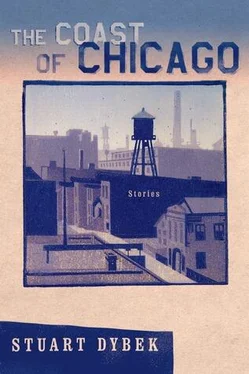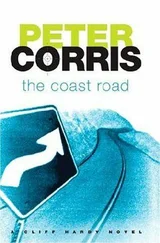In a dream I dreamt that was no dream,
In a sleep I slept that was no sleep,
I saw the junkman in his scattered yard…
Ziggy dug that one, too.
By the time we hit downtown and passed Buckingham Fountain with its spraying, multicolored plumes of light, Deejo would be rhapsodic. One night, standing up in the backseat and extending his arms toward the skyscraper we called God’s House because of its glowing blue dome — a blue the romantic, lonely shade of runway lights — Deejo blurted out, “I dig beauty!”
Even at the time, it sounded a little extreme. All we’d had were a couple of six-packs. Pepper started swerving, he was laughing so hard, and beating the side of the car with his fist, and for a while it was as if he was back behind the wheel of the Chevy. It even brought Ziggy out of his despair. We rode around the rest of the night gaping and pointing and yelling, “Beauty ahead! Dig it!”
“Beauty to the starboard!”
“Coming up on it fast!”
“Can you dig it?”
“Oh, wow! I am digging it! I’m digging beauty!”
Deejo got pimped pretty bad about it in the neighborhood. A long time after that night, guys would still be asking him, “Digging any beauty lately?” Or introducing him: “This is Deejo. He digs beauty.” Or he’d be walking down the street and from a passing car someone would wave, and yell, “Hey, Beauty-Digger!”
The last week before the Fury was repoed, when Pepper would come by to pick us up, he’d always say, “Hey, man, let’s go dig some beauty.”
A couple of weeks later, on a warm Wednesday night in Cleveland, Gerry Staley came on in relief with the bases loaded in the bottom of the ninth, threw one pitch, a double-play ball, Aparicio to Kluszewski, and the White Sox clinched their first pennant in forty years. Pepper had already left on the bus for Parris Island. He would have liked the celebration. Around 11:00 p.m. the airraid sirens all over the city began to howl. People ran out into the streets in their bathrobes crying and praying, staring up past the roofs as if trying to catch a glimpse of the mushroom cloud before it blew the neighborhood to smithereens. It turned out that Mayor Daley, a lifelong Sox fan, had ordered the sirens as part of the festivities.
Ziggy wasn’t the same after that. He could hardly get a word out without stammering. He said he didn’t feel reprieved but as if he had died. When the sirens started to wail, he had climbed into bed clutching his rosary which he still had from grade-school days, when the Blessed Mother used to smile at him. He’d wet the bed that night and had continued having accidents every night since. Deej and I tried to cheer him up, but what kept him going was a book by Thomas Merton called The Seven Storey Mountain , which one of the priests at the parish church had given him. It meant more to Zig than On the Road did to Deejo. Finally, Ziggy decided that since he could hardly talk anyway, he might be better off in the Trappists like Thomas Merton. He figured if he just showed up with the book at the monastery in Gethsemane, Kentucky, they’d have to take him in.
“I’ll be taking the vow of silence,” he stammered, “so don’t worry if you don’t hear much from me.”
“Silence isn’t the vow I’d be worrying about,” I said, still trying to joke him out of it, but he was past laughing and I was sorry I’d kidded him.
He, Deejo, and I walked past the truck docks and railroad tracks, over to the river. We stopped on the California Avenue Bridge, from which we could see a succession of bridges spanning the river, including the black railroad bridge we had pushed the Chevy over. We’d been walking most of the night, past churches, under viaducts, along the boulevard, as if visiting the landmarks of our childhood. Without a car to ride around in, I felt like a little kid again. It was Zig’s last night, and he wanted to walk. In the morning he intended to leave home and hitchhike to Kentucky. I had an image of him standing along the shoulder holding up a sign that read GETHSEMANE to the oncoming traffic. I didn’t want him to go. I kept remembering things as we walked along and then not mentioning them, like that dream he’d had about him and me and Little Richard. Little Richard had found religion and been ordained a preacher, I’d read, but I didn’t think he had taken the vow of silence. I had a fantasy of all the monks with their hoods up, meditating in total silence, and suddenly Ziggy letting go with an ear-splitting, wild, howling banshee blues shout.
The next morning he really was gone.
Deejo and I waited for a letter, but neither of us heard anything.
“He must have taken the vow of silence as far as writing, too,” Deejo figured.
I did get a postcard from Pepper sometime during the winter, a scene of a tropical sunset over the ocean, and scrawled on the back the message “Not diggin’ much beauty lately.” There was no return address, and since Pepper’s parents had divorced and moved out of the projects I couldn’t track him down.
There was a lot of moving going on. Deejo moved out after a huge fight with his old man. Deej’s father had lined up a production-line job for Deejo at the factory where he’d worked for twenty-three years. When Deej didn’t show up for work the first day his father came home in a rage and tried to tear Deejo’s beard off. So Deej moved in with his older brother, Sal, who’d just gotten out of the navy and had a bachelor pad near Old Town. The only trouble for Deejo was that he had to move back home on weekends, when Sal needed more privacy.
Deejo was the last of the Blighters still playing. He actually bought a guitar, though not an electric one. He spent a lot of time listening to scratchy old 78s of black singers whose first names all seemed to begin with either Blind or Sonny. Deejo even cut his own record, a paper-thin 45 smelling of acetate, with one side blank. He took copies of it around to all the bars that the guys from Korea used to rule and talked the bartenders into putting his record on the jukebox. Those bars had quieted down. There weren’t enough guys from the Korean days still drinking to field the corner softball teams anymore. The guys who had become regulars were in pretty sad shape. They sat around, endlessly discussing baseball and throwing dice for drinks. The jukeboxes that had once blasted The Platters and Buddy Holly had filled up with polkas again and with Mexican songs that sounded suspiciously like polkas. Deejo’s record was usually stuck between Frank Sinatra and Ray Charles. Deej would insert a little card handprinted in ballpoint pen: HARD-HEARTED WOMAN BY JOEY DECAMPO.
It was a song he’d written. Deejo’s hair was longer than ever, his Vandyke had filled in, and he’d taken to wearing sunglasses and huaraches. Sometimes he would show up with one of the girls from Loop Junior College, which was where he was going to school. He’d bring her into the Edelweiss or the Carta Blanca, usually a wispy blonde with scared eyes, and order a couple of drafts. The bartender or one of us at the bar would pick up Deejo’s cue and say, “Hey, how about playing that R5?” and feed the jukebox. “Hard-hearted Woman” would come thumping out as loud as the “She’s-Too-Fat Polka,” scratchy as an old 78, Deejo whining through his nose, strumming his three chords.
Hard-hearted woman,
Oh yeah, Lord,
She’s a hard-hearted woman,
Uuuhhh…
Suddenly, despite the Delta accent, it would dawn on the girl that it was Deejo’s voice. He’d kind of grin, shyly admitting that it was, his fingers on the bar tapping along in time with the song, and I wondered what she would think if she could have heard the one I wished he had recorded, the one that opened:
Читать дальше












